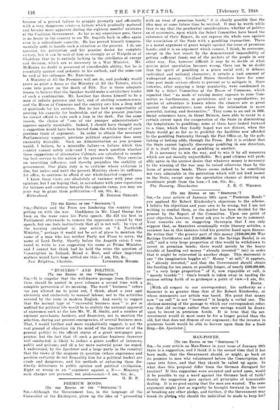PREMIUM BONDS.
[To THE EDITOR OP THE " SPECTATOR."]
Sis,—Although the Government has, in the language of the Chancellor of the Exchequer, given up the idea of " proceeding with an issue of premium bonds," it is clearly possible that the idea may at some future time be revived. It may be worth while then to say that the prudential considerations, whether of politics or of economics, upon which the Select Committee have based the substance of their Report, do not express the whole ease against the association of the State with a gambling transaction. There is a moral argument of grave weight against the issue of premium bonds; and it is an argument which cannot, I think, be overcome, except in the last resort by the demonstrated impossibility of getting sufficient funds out of the pockets of the people in any other way. For, however difficult it may be to decide at what precise point speculation becomes wrong, there can be no doubt that the spirit of gambling is a grave social evil; it debases individual and national character; it entails a vast amount of widespread misery. Civilized States therefore have for some time past made serious efforts to prevent or to mitigate it. State lotteries, after enjoying a large popularity, were condemned in 1808 by a Select Committee of the House of Commons, which reported that " no mode of raising money appears to your Com- mittee so burthensome, so pernicious, and so unproductive; no species of adventure is known where the chances are so great against the adventurer; none where the infatuation is more powerful, lasting, and destructive." They came to an end in 1826. Social reformers have, in Great Britain, been able to count to a certain extent upon the co-operation of the State in diminishing the temptations to gambling; some of them have looked forward to a time, which they fondly hoped was not distant, when the State would go so far as to prohibit the facilities now afforded to the gambling fraternity through the Post Office or, by the pub- lishing of betting odds, through the Press. But it is evident that the State cannot logically discourage gambling in one direction, if it is itself the patron of gambling in another.
It is necessary to win the war, and to win it by all measures which are not morally unjustifiable. But good citizens will prob. ably agree in the earnest desire that whatever money is necessary to the winning of the war may be raised otherwise than by the issue of premium bonds. There seems indeed to be something not very admirable in the patriotism which will not lend money to the State, except upon the speculative chance of deriving an inordinate profit from the loan.—I am, Sir, &c.,


































 Previous page
Previous page